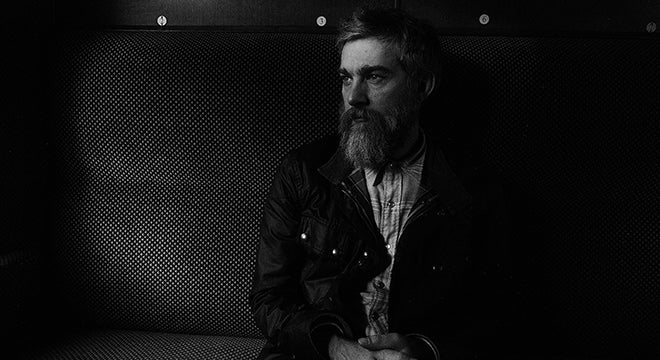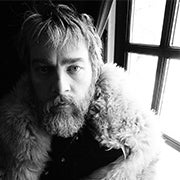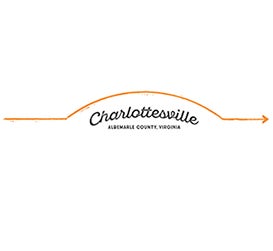
Ethan Johns
Ethan Johns
with Lauren Hoffman
“There’s no sense to stopping now,” Ethan Johns sang on the closing song of his first solo album, 2013’s aptly titled If Not Now Then When? “I may take the long way round.” Those words could serve as the mantra of this renowned producer, multi-instrumentalist and late-blooming artist. “My interest in making music in general—whether it be recording or performing it or helping produce it—always seems to stem from the same place,” Johns notes. “As long as I’m learning something and I’m on the journey and I’m moving forwards, I’m gonna be happy.”
The Reckoning, Johns’ second solo album (released June 2 on his own Three Crows Records), is very much in keeping with his “just go for it” aesthetic, as he ceded control to his friend and frequent collaborator Ryan Adams. When he flew into LA with a fresh batch of songs last September, Johns had no idea what sort of chemical reaction this role reversal with Adams would have on the material; all he knew was that every time the two of them had come together to make a record in the past, the results had been direct and utterly free of artifice.
“I want to push myself as far out as I possibly can,” Johns says of his defining impulse. “If you put yourself in a position when you’re in control of what’s going on, then it becomes quite safe. It works for some people, because of the kind of records that they want to make. They want to make these incredible presentations. Sometimes you want to go for those definitive versions of songs. But for me at the moment, that’s not what I’m going for. It’s more about trying to catch a snapshot of a certain period of time.”
The Reckoning’s 10 timeless songs, penned while Johns toured the UK, Europe, and the US, cohere as a series of cinematically evocative vignettes retracing the journey of the album’s protagonist, Thomas Younger, a young Englishman who follows his reckless older brother James across the Atlantic to the America of the 1850s and treks westward across the endless expanse of frontier, exploring the unknown.
“It was a lot more dangerous to be alive at that point in history,” Johns points out. “The pioneering spirit was always really interesting to me. I think, sadly, the older we get, we realize that life is not easy. James is just this crazy guy who’s just out to live it up, damn the consequences. It’s the selfish side of our nature, which is present in all of us. It’s the survival instinct, and Thomas is sort of the innocent optimist. This idea of consequence is so crucial, and I think we’re really experiencing it now. We are at an incredibly interesting point in history, I think.
“The stories all spring from the song ‘The Lo Down Ballad of James Younger,’” he continues. “It’s about the choices we make as individuals in life, and the effects that those things can have on us. It’s life on a knife edge. It’s about consequences; it’s about balancing the darkness and light in life that’s present in all of us; and trying to make the right choices at the right time.”
The implied narrative takes the listener from the scene-setting fingerpicked opener “Go Slow,” the burnished, string-laden “Dry Morning” and the Dylanesque “Among the Sugar Pines” through the ever-darkening sequence of “Talking Talking Blues,” “The Lo Down Ballad of James Younger” and “Black Heart,” set off by raging storms of slide guitar, to the poignant panorama of “You Changed,” before gliding across the centuries in a heartbeat in the manner of meta-fiction to the closing reflection, “This Modern London.”
“It’s a challenging listen,” Johns acknowledges, “and I hope it’s engaging. The whole point for this to me is the honesty of it. It’s got to be honest, otherwise it becomes entertainment, and I’m not doing it for entertainment purposes, I’m doing it to try and provoke thought within other people. It’s not important how it relates to me; it’s important how it relates to you.”
Johns has been charting his own single-minded course throughout his career. The son of legendary producer/engineer Glyn Johns, Ethan spent his childhood watching his dad make records in the traditional manner, and his purist methodology has animated every record he’s made, including acclaimed albums with Ray LaMontagne, Laura Marling, Kings of Leon, Joe Cocker, Tom Jones and Paul McCartney.
“There are so many different angles of things that you can learn from all of the people that I’ve worked with, and I’ve been incredibly lucky to have been able to become a part of so many different kinds of artists over the years,” he says.
Both as a producer/engineer/mixer and more recently as an artist, Johns has been obsessed with authenticity of expression. It’s the quintessence of his rigorous aesthetic, from the vivid analog sound of his records to the inspired immediacy of the performances they contain—the aim being to capture the moment so fully and honestly that the term “performance” no longer applies.
Some of the most striking examples of this authenticity are found on the records Johns has made with Adams—these two kindred spirits have been engaged in an ongoing dialogue for 15 years now—which goes a long way toward explaining why, when it came time to record his second album, Johns chose to switch the roles of producer and artist with Adams.
“We have a very immediate connection,” Johns told me in 2005, just before the release of 29, the fourth album he’d produced for Adams, starting with Whiskeytown’s Pneumonia in 1998, followed by his sublime solo debut, 2000’s Heartbreaker, and the epic 26-song Gold a year later. “That’s why I enjoy working with Ryan so much, because we communicate musically with each other really well, and we really listen to each other. What makes Ryan interesting is that he’s not afraid to fail. Most artists today forget that you’ve got to be willing to fail to do good stuff.”
“I walked down there about four or five o’clock in the afternoon,” Johns recalls. “He had a couple of microphones set up, and we made recordings of the first eight songs in sequence. I’m pretty sure I only sang everything once. I think there was one song that he asked me to do again. I had no real idea where I was. I had just gotten off a plane, I had been on the road for months, and then all of a sudden it was 10 o’clock at night and we’d recorded 80 percent of the record. We left the studio to go and watch a movie, and that was it. The next day I came in and I did the next two, and that’s the record.”
This dynamic was very much in play when Johns entered Adams’ PAXAM Studio on the grounds of Hollywood’s iconic Sunset Sound just a few hours after flying into LA during a solo tour of America. Adams hadn’t heard any of the songs, and he’d suggested that Johns join him in the studio to demo them acoustically.
The Reckoning manifests the deep connection between these longtime collaborators in a striking new way. All the signifiers we’ve come to associate with Johns’ productions are vividly present on this turning of the tables, as Adams intuitively delivers the richly detailed analog sound, arrangements in which every note counts, real-time immediacy and, above all, the emotional authenticity both are so passionate about achieving.
“Ryan’s great at distraction, because he doesn’t want to hear the mental process in a performance; he wants to get as unfettered a performance as he possibly can,” Johns says admiringly. “He finished the record without me, which was great. Again, my job was done in about five hours. I came in, I played the songs, sang them to him, he got what he wanted out of the performances. I think he felt that they were as real as they could possibly be, and as I listen to them now, it’s a snapshot in time. It really does create that feeling of tension, fragility, humanity; there’s fear where it’s appropriate.
“I knew it was going to be the most extreme and terrifying experience I could throw myself into,” he says with a laugh. “But I wanted that to be on the record; I wanted that to be a part of the listening experience; and it really works. You can hear me warming up vocally. The point was that that’s how I sang the songs that evening, but there are no compromises, absolutely no compromises anywhere on the record. For me, conceptually, it works brilliantly, because I’m completely detached from them. They are as sort of visceral, if you like, as you can possibly get.
“I know the guy really well; we’ve known each other for a long time now,” Johns continues. “When I sing a song for him and he records it and he goes, ‘That was incredible,’ that’s enough for me. I also know that other people are going to hear it and not like it, and that’s OK. You start going down that road, you start shaving all the edges for some bizarre idea that might please more people, and of course, it just doesn’t seem to make any sense. You can’t go down that road, you’ve got to let everything just exist in the way that it exists.”
Or, as Adams succinctly puts it, “Sometimes, producing’s about not producing.”
Read More
Design VisualSHOWINGS
This event has already occurred.
The Southern
-
Sat, Apr 20, 2024
The Wilson Springs Hotel
-
Sun, Apr 21, 2024
Music Open Mic
-
Mon, Apr 22, 2024
(Almost) Every Monday Open Mic - Hosted by Chris Alan
-
Wed, Apr 24, 2024
Austin Meade







